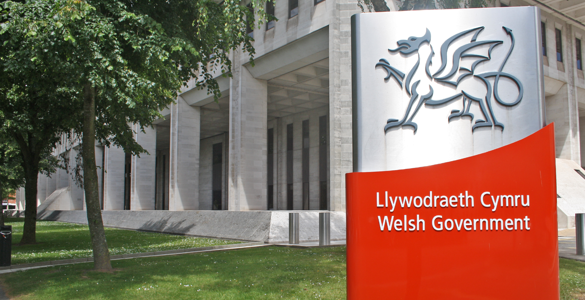The Senedd’s Finance Committee is today publishing its report on the Welsh Government’s Draft Budget for 2021-22, voicing serious concerns for public services, inequality and the economic impact of the COVID-19 pandemic.
The Committee is clear that the need to address and alleviate poverty is more critical than ever, with the pandemic deepening the problems already faced by low-income and disadvantaged households.
In holding the Welsh Government to account on its spending, at a time when many businesses are receiving financial support from the Welsh Government, the Finance Committee supports calls for the simplification and consolidation of the financial assistance schemes available.
In addition to the Finance Committee’s scrutiny of the Welsh Government’s Draft Budget, the Senedd’s policy committees have examined all aspects of the budget and made recommendations.
Budget Uncertainty
There has been an unprecedented level of uncertainty regarding the UK Government’s budgets and spending reviews over the past few years due to Brexit, the UK General Election and the COVID-19 pandemic.
For the past three years the Welsh Government has had to produce a draft budget based on a one-year revenue settlement.
The UK Government’s Budget is set for 3 March 2021 - the timing of this means the Welsh Government’s Final Budget will not reflect the content of the UK Budget.
The Finance Committee has previously raised concerns about this uncertainty and its impact on the Welsh Government’s ability to plan ahead financially.

Impact on Health and Social Care
The COVID-19 pandemic is obviously dominating all spending decisions on a UK and Welsh level and it is clear the Finance Minister expects further COVID-19 funding from the UK Government.
It is essential that the vaccine roll-out continues at pace and the Finance Committee welcomes the certainty of funding provided in the Draft Budget for the vaccine and Test, Trace and Protect programmes.
The Finance Committee is worried about the impact of the pandemic on non-COVID care, due to sustained pressure on the NHS and its healthcare workers. The Finance Committee also believes the impact of the pandemic on mental health will be considerable over the next year and beyond.
The Health, Social Care and Sport Committee agrees the public health emergency Wales is facing should not be underestimated, either in terms of responding to the immediate challenges of the pandemic, or the need to do what can be done to maintain the vital non-COVID services on which people rely.
The Committee believes the true scale of the implications for the health and wellbeing of people in Wales, may not become clear for years.
The crisis has also exacerbated underlying issues, including the fragility of the social care sector, the ongoing health inequalities across Wales, and the need for a clear strategic vision to drive health and social care integration and service transformation.
The course of the pandemic over the coming months remains uncertain, and there will be difficult choices to be made about the prioritisation of limited resources.
Nevertheless, the Health Committee is calling on Ministers to be proactive in their planning and engagement with partners to identify where there may be additional needs and where there may be opportunities for reform and improvement to ensure that sufficient resources are available.

Pressure on Local Government and Education
The Finance Committee is concerned to hear that the increased funding in the local government settlement will not cover all cost pressures, such as social care, childcare, and education.
The Finance Committee is deeply concerned about the risks to children, particularly those from disadvantaged backgrounds and those in early years, falling behind in their education as a result of the pandemic. The Finance Committee is calling for more information about how funding will support learners to ‘catch up’ while also delivering the current ways of learning.
The Children, Young People and Education Committee has called for children and young people’s rights and needs to be a key consideration for all Welsh Government Ministers when making decisions about funding to tackle the impact of COVID-19.
The Welsh Government has not received any additional funding to provide for public sector pay awards, with the exception of the NHS and those on the lowest wages.
There is also a concern that the implications of pay in 2021-22 will be significant and will need to be absorbed by local council budgets.
The Equality, Local Government and Communities Committee believes that ensuring sufficient resources to fund the Council Tax Reduction Scheme and to tackle homelessness should be priority areas for the Welsh Government’s budget. Both areas have seen a significant rise in demand as a result of the Covid-19 pandemic

Economy, Skills and Regeneration
The Finance Committee heard evidence that the Draft Budget does not provide a coherent approach to supporting businesses through the pandemic.
While recognising that it may be sensible to allow some degree of flexibility, the Committee is concerned that the implementation of the business support packages has been “patchy” with smaller businesses finding it harder to access funds.
This has been further complicated by the different approaches to business support from different Governments within the UK.
The Committee believes the Draft Budget could have been clearer in outlining the Welsh Government’s long-term approach to potential shifts in consumer behaviour towards online retailers and the effect on local economies. The Welsh Government should rethink previous policies on revitalising town centres in light of the pandemic.
As well as the forecasted impacts on employment, the crisis could permanently alter the economy, with fundamental shifts in working patterns, behaviours and the labour market. The Finance Committee believes that investment in skills and employability is essential for Wales’s recovery from the pandemic.
Digital connectivity has also become increasingly critical in enabling new ways of working through the pandemic – the Finance Committee is calling for more to be done to ensure consistency of access across Wales and training in digital skills for businesses and individuals.
The Economy Infrastructure and Skills Committee added its concern that the rate of uptake of ‘sector specific’ business support has been lower than expected.
The Committee recommends the Welsh Government set out what evaluation there has been of the effectiveness of the Business Wales website and support services, to identify any further measures needed to help businesses understand the entire range of support available.
With many businesses receiving support however, the Committee is calling for a COVID-19 ‘exit plan’ for the Welsh economy for when funding ends.
"Our businesses need support more than ever, with many being forced to close. For them to have a future after this pandemic, we support calls for the simplification and consolidation of the financial assistance schemes available."
Llyr Gruffydd MS, Chair of the Finance Committee

Climate Change and Decarbonisation
The Finance Committee is concerned that plans to tackle climate change and decarbonisation are not clear or how climate change action and decarbonisation is being mainstreamed in the budget process. More work is required to meet the Welsh Government’s ambitions to decarbonise and build a greener economy in a post-pandemic environment.
In its scrutiny process, the Climate Change, Environment and Rural Affairs Committee heard widespread consensus that recovery from the pandemic offers an opportunity to address underlying climate and nature emergencies.
The Committee believes that climate change and nature’s decline are not on pause. The State of Natural Resources Report 2020 concludes Wales has not met any of the four aims of the sustainable management of natural resources. Iconic species are predicted to become extinct within decades and ecosystem resilience is declining in line with global trends.
The Committee wants to see clear evidence of spending decisions that support a green recovery, and that better reflect the urgency of the climate and nature emergencies. While there have been increases in allocation in some areas the Committee is not convinced that the overall level of investment is sufficient to drive forward change.
A Future for the Cultural Sector
The Culture, Welsh Language and Communications Committee has outlined how the Welsh Government should, as a matter of urgency, confirm what funding will be in place to support organisations and individuals in the cultural sector after March 2021.
The Committee is calling on Ministers to outline the criteria on which the Welsh Government will be basing decisions on permitting activity such as live music and theatre performances to enable the sector to plan.

Brexit and EU Transition
This Draft Budget also comes as the UK is transitioning out of the EU.
The Finance Committee has regularly stated its concern over the lack of clarity and transparency on the future ‘UK Shared Prosperity Fund’ which replaces EU funding.
These concerns remain.
Evidence has highlighted that these worries are shared by many organisations. The Committee is disappointed that details of the UK Shared Prosperity Fund have not been finalised at this stage and is calling for more urgency.
Llyr Gruffydd MS, Chair of the Finance Committee said:
“This is the final Draft Budget of the Fifth Senedd. This year the pandemic has delayed UK fiscal events, resulting in delays to publication of the Welsh Government’s Draft Budget. This has reduced our time for scrutiny which is particularly concerning given that COVID-19 will have an impact on public spending for years to come.
“This Draft Budget, is very much a draft. A lack of forward funding figures with only a one- year revenue funding settlement, and the timing of the UK Government’s Budget set later for 3 March has made budget-setting even more challenging for the Welsh Government.
“Much of our work is focused on the COVID-19 pandemic. Whilst welcoming the extra money for health and social services, the Committee is concerned about the long-term impacts on non-COVID care. We also have serious concerns over workforce capacity and mental health.
“Our businesses need support more than ever, with many being forced to close. For them to have a future after this pandemic, we support calls for the simplification and consolidation of the financial assistance schemes available.
“COVID-19 has brought many serious challenges and the financial impact on health, the economy and public services will be felt by society for years to come. While there is a need to respond to the immediate situation we are hopeful that there is an opportunity for longer term planning to ensure that Wales can recover strongly."




